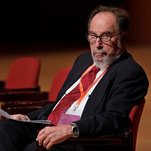David Baltimore, the celebrated molecular biologist and Nobel Laureate, has passed away at the age of 87. His groundbreaking research fundamentally reshaped the understanding of retroviruses and their role in diseases, including H.I.V. This profound impact on the field of biology will be felt for generations to come.
Born in 1934, Baltimore achieved remarkable success early in his career. At just 37 years old, he co-discovered the enzyme reverse transcriptase, which is crucial in the replication of retroviruses. This work not only challenged existing biological paradigms but also paved the way for advances in the treatment of various viral infections, particularly H.I.V.. His contributions to science earned him the Nobel Prize in Physiology or Medicine in 1975, an accolade that recognized his significant role in understanding viral genetics.
Legacy of Innovation in Science
Baltimore’s career spanned over six decades, during which he held prestigious positions, including president of the California Institute of Technology and director of the Johns Hopkins University Institute of Basic Biomedical Sciences. His leadership in these institutions fostered an environment of innovation and inquiry, influencing countless young scientists.
His research not only focused on retroviruses but also extended into cancer biology and immunology, shaping the landscape of modern medicine. Baltimore was known for his ability to bridge complex scientific concepts with public understanding, making him an influential figure not just in academic circles but also in broader societal discussions about health and disease.
Impact on Global Health and Education
Beyond his scientific achievements, Baltimore was a dedicated educator and mentor. He inspired numerous students and peers, emphasizing the importance of scientific inquiry and ethical responsibility in research. His commitment to fostering the next generation of scientists ensured that his influence will persist in future discoveries.
Baltimore’s work has had lasting implications for public health, particularly in the fight against H.I.V. and other viral diseases. His discoveries have informed the development of antiretroviral therapies that have transformed the lives of millions around the world.
As the scientific community mourns his passing, his legacy serves as a powerful reminder of the importance of curiosity, perseverance, and the pursuit of knowledge in the face of challenging questions. David Baltimore’s contributions to science and humanity will not be forgotten.

































































